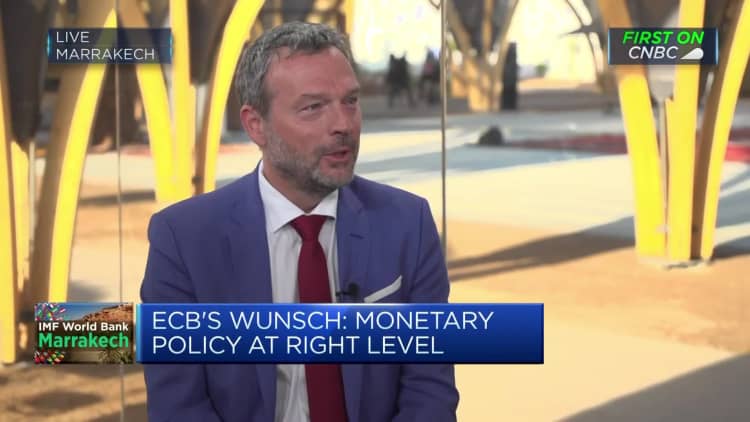The European Central Bank headquarters.
Daniel Roland | Afp | Getty Images
The European Central Bank ended its run of interest rate hikes on Thursday, despite new upside risks to inflation from oil markets amid the Israel-Hamas war.
The key rate is set to remain at a record high of 4%, where it was brought through 10 consecutive hikes that began in July 2022 and brought rates back into positive territory for the first time since 2011.
The Governing Council said recent information confirmed its medium-term outlook for inflation to reach 2.1%.
“Inflation is still expected to stay too high for too long, and domestic price pressures remain strong. At the same time, inflation dropped markedly in September, including due to strong base effects, and most measures of underlying inflation have continued to ease,” it said in a statement.
Markets had priced in a more than 98% chance of a hold, after the ECB gave a strong indication at its previous meeting that rates had peaked.
The move in September was described as a dovish rise, as the ECB said rates had reached levels that would substantially contribute to the fight against inflation, if “maintained for a sufficiently long duration.”
It repeated this message on Thursday, and said its decision making remains data-dependent.
ECB officials have in interviews stressed a ‘higher for longer’ message on rates, while insisting that an inflationary shock could spur them to hike again, as they seek to dampen market expectations of rate cuts on the horizon.

The central bank needs monetary policy to remain sufficiently tight to meet its current inflation forecasts of 5.6% this year, 3.2% next year and 2.1% in the “medium term.”
However, the ECB must also reckon with persistently weak business activity and tepid growth forecasts of 0.7% in 2023 and 1% in 2024, as former EU powerhouse Germany stagnates.
The bank is also assessing volatility in the bond market, where yields have risen sharply, reflecting a global sell-off.
Marcus Brookes, chief investment officer at Quilter Investors, said risks to inflation remained in wage growth and in energy prices going up as a result of uncertainty in the Middle East.
“Going forward, like other central banks, it will say the market needs to expect higher interest rates for longer, with the door being left open should we see inflation spike again,” Brookes said in an emailed note.
“However, given the stagnating economy and the fact other central banks have moved into a holding pattern, something very unexpected would need to happen for rates to be raised again. The pressure will quickly shift to cutting rates given the lack of economic growth.”
Credit: Source link













